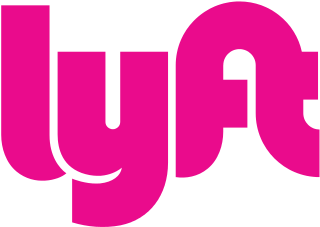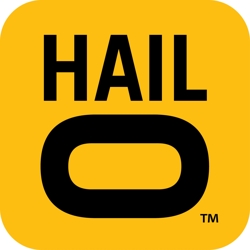
Carpooling is the sharing of car journeys so that more than one person travels in a car, and prevents the need for others to have to drive to a location themselves.

In New York City, taxicabs come in two varieties: yellow and green; they are widely recognizable symbols of the city. Taxis painted yellow are able to pick up passengers anywhere in the five boroughs. Those painted apple green, which began to appear in August 2013, are allowed to pick up passengers in Upper Manhattan, the Bronx, Brooklyn, Queens, and Staten Island. Both types have the same fare structure. Taxicabs are operated by private companies and licensed by the New York City Taxi and Limousine Commission (TLC). It also oversees over 40,000 other for-hire vehicles, including "black cars", commuter vans, and ambulettes.

Lyft, Inc. offers mobility as a service, ride-hailing, vehicles for hire, motorized scooters, a bicycle-sharing system, rental cars, and food delivery in the United States and select cities in Canada. Lyft sets fares, which vary using a dynamic pricing model based on local supply and demand at the time of the booking and are quoted to the customer in advance, and receives a commission from each booking. Lyft is the second-largest ridesharing company in the United States after Uber.

The New York City Taxi and Limousine Commission is an agency of the New York City government that licenses and regulates the medallion taxis and for-hire vehicle industries, including app-based companies such as Uber and Lyft. The TLC's regulatory landscape includes medallion (yellow) taxicabs, green or Boro taxicabs, black cars, community-based livery cars, commuter vans, paratransit vehicles (ambulettes), and some luxury limousines.

John Zimmer is the co-founder and president of Lyft, an on-demand transportation company, which he founded with Logan Green in 2012.

Shared transport or shared mobility is a transportation system where travelers share a vehicle either simultaneously as a group or over time as personal rental, and in the process share the cost of the journey, thus creating a hybrid between private vehicle use and mass or public transport. It is a transportation strategy that allows users to access transportation services on an as-needed basis. Shared mobility is an umbrella term that encompasses a variety of transportation modes including carsharing, Bicycle-sharing systems, ridesharing companies, carpools, and microtransit.

Zimride by Enterprise Holdings was an American carpool program that matched inter-city drivers and passengers through social networking services. It was offered to universities and businesses as a matchmaking service. The company was founded in May 2007. After the launch of the Lyft app in May 2012 for intra-city rides, the Lyft app rapidly grew and became the focus of the company. Zimride officially renamed as Lyft in May 2013, and the Zimride service was sold to Enterprise Holdings in July 2013. As of July 2013, the service had over 350,000 users and had partnerships with Facebook and Zipcar.
Sidecar was a US-based vehicle for hire company that provided transportation and delivery services. It was founded in 2011 in San Francisco and closed on December 31, 2015.

Hailo was a British technology platform that matched taxi drivers and passengers through its mobile phone application. Founded in London in 2011, the Hailo taxi service was available in 16 cities.

A ridesharing company is a company that, via websites and mobile apps, matches passengers with drivers of vehicles for hire that, unlike taxicabs, cannot legally be hailed from the street.
Many communities, governments, and organizations have established rules and regulations that specifically govern ridesharing companies. In some jurisdictions, for-profit ridesharing operations are completely illegal. Regulations can include requirements for driver background checks, fares, the number of drivers, and licensing.
A robotaxi, also known as robo-raxi, self-driving taxi or driverless taxi, is an autonomous car operated for a ridesharing company.
asterRIDE is a referral company that operates and markets transportation services on behalf of limousine and taxi operators across the cities where they operate. AsterRIDE markets their web platform and mobile app asterRIDE, which connects passengers with taxi drivers. As of June, 2015, asterRIDE was available in ten U.S. cities and growing: Chicago, Everett, Fort Lauderdale, Los Angeles, Miami, Naples, Orlando, Phoenix, San Diego, San Francisco, Seattle, and West Palm Beach. According to a release on their website, Las Vegas, New York City, Houston, and Philadelphia were to be added.
Rideshare advertising is a form of digital, out-of-home advertising that uses in-car advertisements in ridesharing vehicles.
Careem is a Dubai-based super app with operations in over 100 cities, covering 12 countries across the Middle East, Africa, and South Asia regions. The company, which was valued at over US$2 billion in 2018, became a wholly-owned subsidiary of Uber after being acquired for $3.1 billion in January 2020. Careem expanded into the food delivery business with Careem Now in November 2018 and launched a digital payment platform, Careem Pay in April 2022.
inDrive, is an international ride-hailing service with more than 150 million downloads operating in 47 countries. Headquartered in Mountain View, California, it is the second largest ridesharing and taxi app worldwide by downloads. The company was officially launched in 2013.
A series of general strikes was coordinated on March 25, 2019 by Lyft and Uber drivers in Los Angeles, San Diego and San Francisco, California, United States led by rideshare advocate group Rideshare Drivers United. The strikes aimed to protest low wages, long hours, working conditions, and lack of benefits. The event was planned following Lyft's initial public offering. A second strike took place on May 8, 2019 in anticipation of Uber's initial public offering. The strike in response to Uber's IPO took place in 25 major cities across the United States, and were also joined by drivers in other locations worldwide where Uber operates.

Homobiles is an American nonprofit organization founded in 2011 which provides rides primarily to the San Francisco LGBT community on a pay-what-you-can model. Lynn Breedlove founded the organization as an alternative to taxi services and public transportation in order to counter discrimination against drag queens, transgender riders, and other members of the LGBT community. Rides are arranged through phone call, text message, or mobile application similar to other transportation network (ridesharing) companies.
The Drivers Cooperative or Co-Op Ride is an American ridesharing company and mobile app that is a workers cooperative, owned collectively by the drivers. The cooperative launched in May 2020 in New York City, with the first 2,500 drivers issued their ownership certificates in a media event.

Moovn Technologies, LLC, commonly known as Moovn, is an American ridesharing company based in Seattle.











